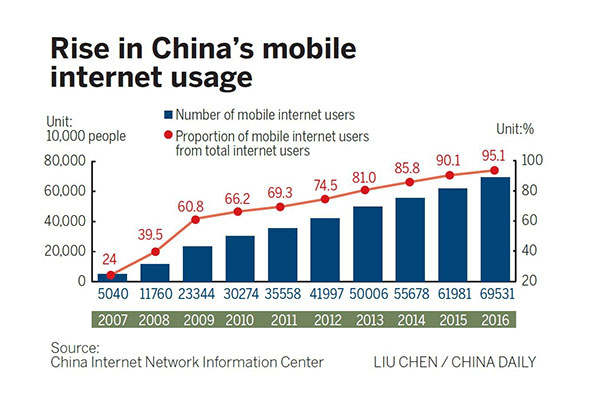
With smartphone apps now the answer to more real-life demands, mobile internet use has surged in China, although the advancing technology could pose a challenge for late adopters.
As apps have made it easier to hail taxis, order takeout and pay utility bills, people have embraced the mobile internet as a way of life, according to a report released on Jan 22 by the China Internet Network Information Center.
China had more than 695 million mobile internet users by the end of last year, a 12 percent year-on-year increase, accounting for 95 percent of the nation’s 731 million netizens, the report said.
Liu Xin, director of the center’s internet development research department, attributed the surge to mobile online payment services.
“In major cities, it’s common to see people go out to work or go shopping without taking their wallets,” he said. “It seems everything you need in daily life can be done using a smartphone app.”
According to the report, 469 million people used mobile apps for a range of payment services last year, including paying credit card bills, buying movie tickets and booking fitness services. This was a 31 percent increase on the previous year.
Wang Xuning, an employee at an IT company, said he does not know how to pay his water and electricity bills offline.
“I’m used to paying the fees on Alipay and WeChat,” Wang said, referring to two major mobile payment providers. “All I need to do is to transfer some money to my e-wallets on these apps and just click on my cellphone.”
However, some observers have voiced concern that the fast-evolving technology will present a challenge to the large number of people who do not use mobile internet.
Last year, 642 million people in China, more than 60 percent of them from rural regions, still had never accessed the internet.
“There are still many people who seldom use the internet because of poor resources and education,” said Yang Xiaodong, a researcher at Peking University’s National Institute of Strategic Communication.
“Mobile device manufacturers and online service providers should develop more low-entry and easy-to-operate products for these people, while the government should also upgrade infrastructure and offer them better education,” he added.
